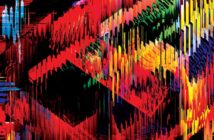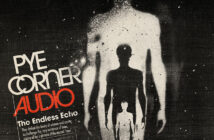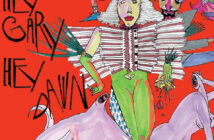
I can’t imagine Henrik Jonsson would be overly offended if his Porn Sword Tobacco full-length debut Explains Freedom were characterized as a strange, even bizarre, collection. After all, in addition to the meditative settings of ambient shimmer we would expect to hear on this follow-up to his 2004 debut, Jonsson includes settings whose musical elements are almost buried under field noises (“Naturens Kraft Och Klang” sounds like it was recorded inside a tent with heavy rainfall beating outside, while the rainfall intensifies into an even heavier downpour in “Ta Med Skogen Hem”), and includes one that contains nothing but field elements (rustlings, creaks, and rumblings in “Dina Upptäckter Ritar Kartan”). Even more oddly, there are reggae outings (“Najaf Library Card (Dub Mix),” a narcotized haze of synth sputter, distorted voices, and bass thuds, and the jubilant dub “Futuristic Rasta Money”) plus two kitschy bonus tracks in a bright ‘80s-styled synth pop style that one hopes is intended ironically.
That Explains Freedom was recorded in the heart of a Swedish forest doesn’t surprise either, given the thick, smeary hiss that coats much of the material. The hiss resembles water, making the album sound like it was recorded at the seashore, with bird chirps and other ambient noise surfacing regularly throughout. At other times, dense waves of hiss assume an industrial character (“Dina Upptäckter Ritar Kartan”). The production style is unusual too, with instruments pushed loudly to the forefront of the mix, with minimal keyboard melodies piercing the hiss with sharp stabs in “Soft Airgun & Electric” and “Praying With Benny.” As one might expect from a 51-minute collection of nineteen songs, many are short vignettes (only three exceed four minutes) whose pensive piano melodies, acoustic guitar plucks, string washes, and synth chords vaguely recall the music of Eno and Harold Budd. “Carl Zeiss Driving To Work,” for instance, evokes the home-made synth-heavy ambiance of Eno’s Music for Films while “Thank You!” drops a chiming Kraftwerk melody into its center and “Old Booze, New Friends” suggests the hazy ambient style of Marsen Jules. “Detta Ar Kärleken Som Dansar,” an elegant and pretty synth-pop instrumental, is one of the few pieces one could label a full-fledged composition as opposed to a fragment, vignette, or soundscape.
Ultimately, however, the collection comes across as a confused grab bag lacking in coherence as opposed to wide-ranging. In upcoming releases, Jonsson might be wiser to concentrate on creating a smaller number of more polished pieces that can fit together into a satisfyingly uniform whole.
Ron Schepper



